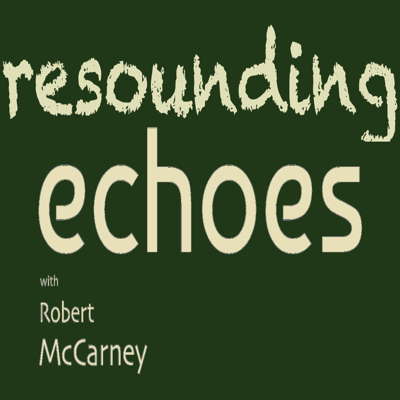 RESOUNDING ECHOES: Beginning in 2022, Robert McCarney's occasional series features little-known twentieth century classical composers.
RESOUNDING ECHOES: Beginning in 2022, Robert McCarney's occasional series features little-known twentieth century classical composers.
Still Young After Two Hundred Years
GIUSEPPE PENNISI reports on a special anniversary season of the Accademia Filarmonica Romana
A special season of the Accademia Filarmonica Romana (Roman Philharmonic Academy) was inaugurated on 25 October 2021: it marks two hundred years of activity of a private concert society created by young 'amateur' aristocrats of Rome when the Pope was King as well. The concert is a tribute to Giuseppe Sinopoli, longtime associated with the Philharmonic. It includes pieces by Mahler (a favourite composer of Sinopoli) that frame music by Sinopoli himself, rarely heard in Italy and first performed in Rome. The concert attracted much of the Roman 'music world': performers, critics and music organizers. The orchestra seats were full as well as the central boxes of the Teatro Argentina that Stendhal called 'the most elegant' seen on his trip to Italy. Many young people were in the audience.
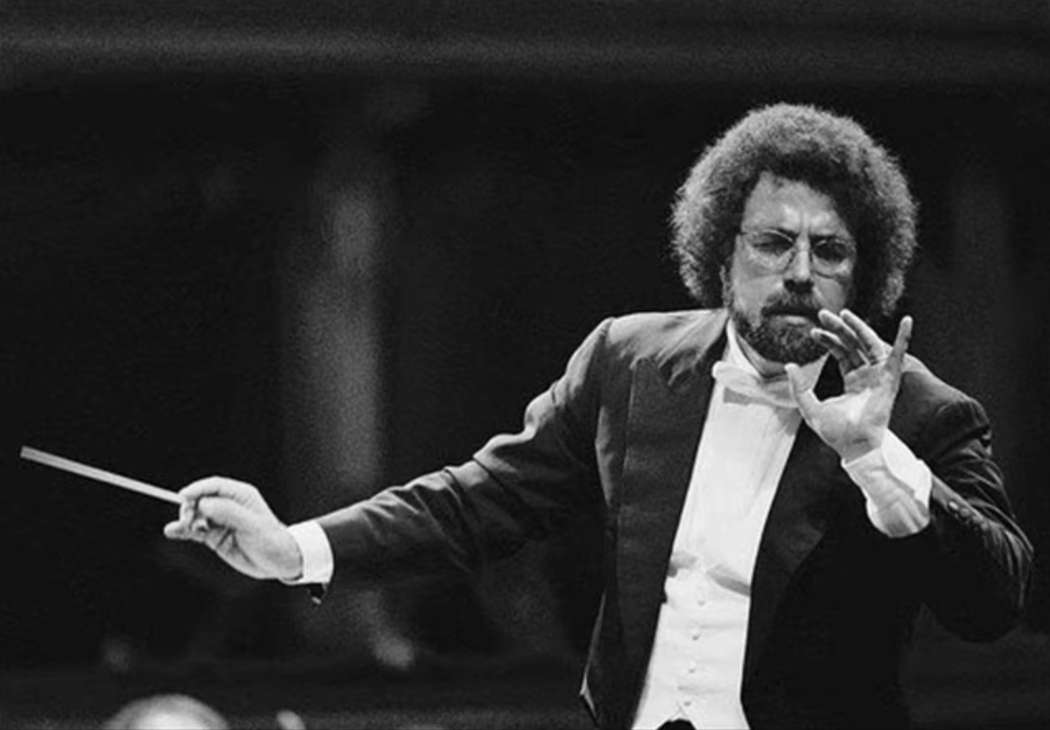
Giuseppe Sinopoli (1946-2001)
Mahler conceived the Lieder eines fahrenden Gesellen (Songs of a Wayfarer) when he was just twenty-five years old, in 1885. He wrote both the lyrics and the music, in the original version for voice and piano. Only in 1893-96 did he make the better known version for orchestra, immediately after composing his First Symphony (which, among other things, takes up some Lieder melodies). The Rückert-Lieder belong to the early years of the new century, composed between 1901 and 1904 on poems by Friedrich Rückert, and published in 1905, in the same period as the Fifth and Sixth Symphonies. If the previous Lieder follow a late Romantic style, in the Rückert shines an intimate writing and poignant emotionality that alternates with moments of euphoria; this is typical of more mature Mahlerian writing.

Gustav Mahler (1860-1911) in circa 1885
Mahler's Lieder frame Sinopoli's Klangfarben (Musical Timbres) dated 1977 for five solo strings and Fragments from Lou Salomé, an unpublished version for voice and chamber orchestra curated by his son, the musician and composer Marco Sinopoli. They were taken from the opera and performed in absolute premiere. Composed in two acts to a libretto by Karl Dietrich Gräwe, premiered in May 1981 at the Bayerische Staatsoper in Munich, Lou Salomé is inspired by the memoirs of the Russian writer and psychoanalyst Lou Andreas Salomé, linked to intellectuals such as Rilke and Nietzsche. This is Sinopoli's last work - he decided to stop composing after 1981; the opera was revived only once, in 2012 at the Teatro La Fenice in Venice.
The Lieder eines fahrenden Gesellen were performed in the chamber orchestra version elaborated by Arnold Schoenberg in 1920 with a mezzo (Monica Bacelli) instead of a baritone as often done, especially in the most popular recorded versions such as, for example, the Mahler collection prepared by Deutsche Grammophon in 2011 on the occasion of the centenary of the composer's death. Schoenberg's reworking lends itself very well to a reduced orchestra and to the acoustics of a theatre smaller than the large halls conceived for symphony concerts. The Ensemble In Canto conducted by Fabio Maestri delved into precious sounds. Monica Bacelli rendered well the fahrender Gesell (companion on the road, wandering friend or simply 'one on the way'). She gave the Lieder the almost adolescent tone of a young man, little more than a boy, who explores the world of nature after being estranged from the real world when his beloved abandoned him to marry another. Monica Bacelli is almost poignant in the last Lied, on the link between 'love and pain' and on the ennui de vivre. The performance emphasizes that unlike Schubert's winter journey, these Mahler Lieder dissolve into a serene and transfigured atmosphere.
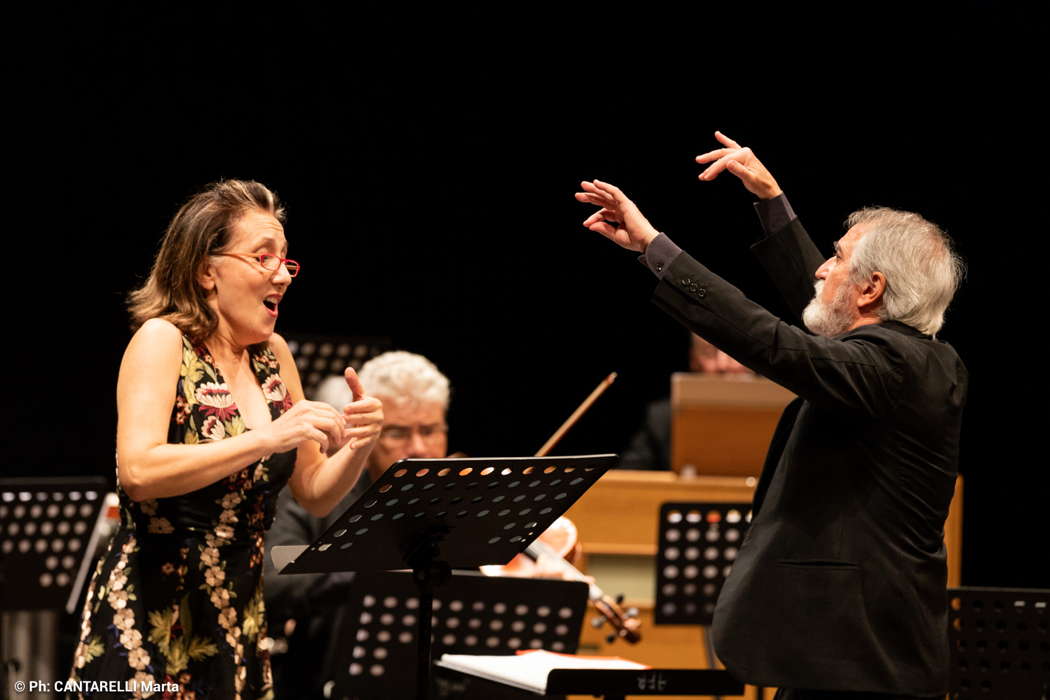
Omaggio a Giuseppe Sinopoli: Monica Bacelli and Fabio Maestri in Teatro Argentina. Photo © 2021 Marta Cantarelli
Klangfarben is Sinopoli's short homage to the twelve-tone music style; it lasts no more than a piece by Anton Webern. The five string instruments, soloists of In Canto, dialogue in a stringent way and with a virtuosity that can make us think of a twelve-tone baroque.
An imposing work, Lou Salomé is Giuseppe Sinopoli's only theatrical experiment. After the first performance in Munich in 1981 - it was commissioned by the Nationaltheater of Bavaria - he withdrew the score with the intention of putting his hand back in it, but later abandoned compositional activity to devote himself exclusively to conducting. It was revived in 2011 by the Teatro La Fenice in Venice. Lou Salomé was a writer and psychoanalyst - a pupil of Freud - with roots between St Petersburg and Germany. She was named as the 'great Russian revolution' in Nietzsche's life. Rilke was also in love with her. These characters, like the philosopher Paul Reé, a friend of Nietzsche, and Friedrich Carl Andreas, whom Lou would marry, are the chorus around the protagonist of the work: She.
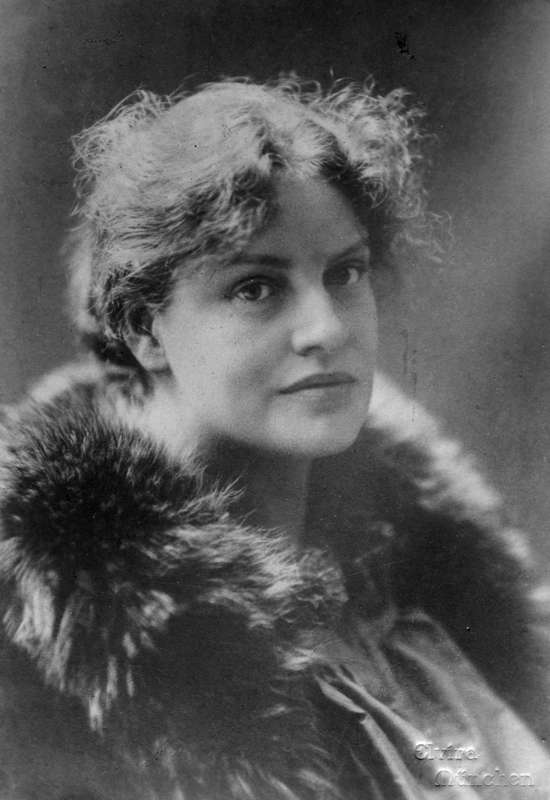
Lou Salomé (1861-1937) in circa 1897
Sinopoli's widow, pianist Silvia Cappellini, refers to Lou Salomé thus :
An exceptional woman - a free spirit who, in the work of my husband, is in search of God and above all of herself; she attempts to give answers to the questions related to the meaning of life. In the end, she will accept her limitations and say yes to death, with a certain sense of serenity.
Lou Salomé was also the subject of a 1977 film by Liliana Cavani at the time considered daring. She was born in 1861, the year in which serfs were freed in Russia. She witnesses the departure of millions of people to an unknown freedom. This is the subject of the first act, after the prologue in which she appears at the end of her existence. She meditates, she dreams, she remembers while in front of her fragments of memories, thoughts, visions rise again. The narration proceeds in a series of scenes that follow one another, inspired by the memories of Lou Salomé, a woman similar to Alma Mahler in certain aspects. The role requires a soprano and an actress: in the only two productions - Munich and Venice - they were the soprano Ángeles Blancas Gulín and the actress Giorgia Stahl.
The 'fragments' are the work by Marco Sinopoli (who physically resembles his father). Composer, arranger and multi-instrumentalist, he studied both classical composition and jazz. He received several commissions as a composer. In 2018, he founded the 'Marco Sinopoli-Extradiction' ensemble with which he develops his original music in a transversal jazz-classical approach, releasing the first album Chromatic landscape in 2021 on Parco della Musica records. In 2019, he won the international Macerata Opera Festival prize and a commission for the musical theatre work Can you heart me? which had several performances at the Macerata Festival and at the Roma Europa Festival. The 'fragments', therefore, are the result not so much of the work by the 'composer's son' but by a free-standing high quality composer who, faithful to his father's intentions, has reworked the score from large orchestra to an ensemble. Soprano Sabrina Cortese presents an assertive and sensual Lou Salomé who 'says yes to death' after enjoying 'freedom to live'. The orchestral interlude was well-chosen and well-rendered.
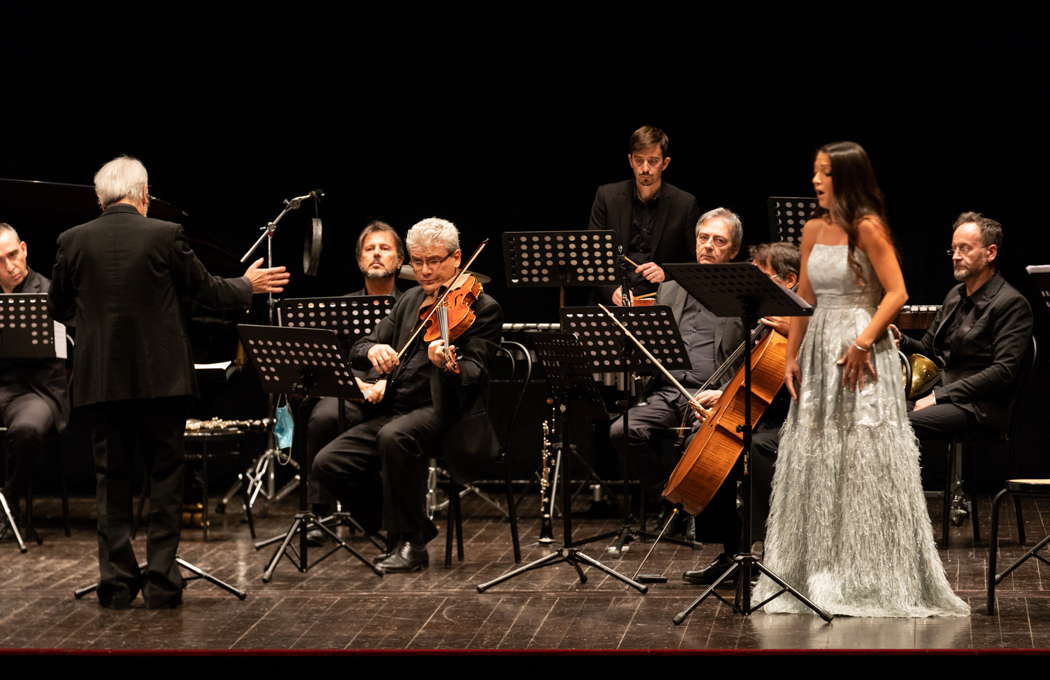
Omaggio a Giuseppe Sinopoli: Fabio Maestri, Sabrina Cortese and members of In Canto in Teatro Argentina. Photo © 2021 Marta Cantarelli
The concert ended with Mahler's well-known and often performed Rückert-Lieder. The first performance took place in Vienna at the Großer Musikvereinsaal on 29 January 1905 under the direction of Mahler himself. On the same evening, Mahler's Kindertotenlieder were also performed; the musician wanted this combination to balance a dark and painful work with a more serene song collection and disenchanted atmosphere. He did not leave any prescription for the order of performance of each song, leaving the choice to the interpreters; the sung part could be entrusted to a baritone or an alto; finally, he used a different orchestral formation for each of the five pieces. Thus, Fabio Maestri's version for reduced ensemble (but not quite a chamber orchestra) for a mezzo (Monica Bacelli) is in line with the composer's intentions. The performance emphasizes the loosening of the supreme inner meditation - the main theme of all Mahler's works - and turning into serenity.
There were applause and accolades.
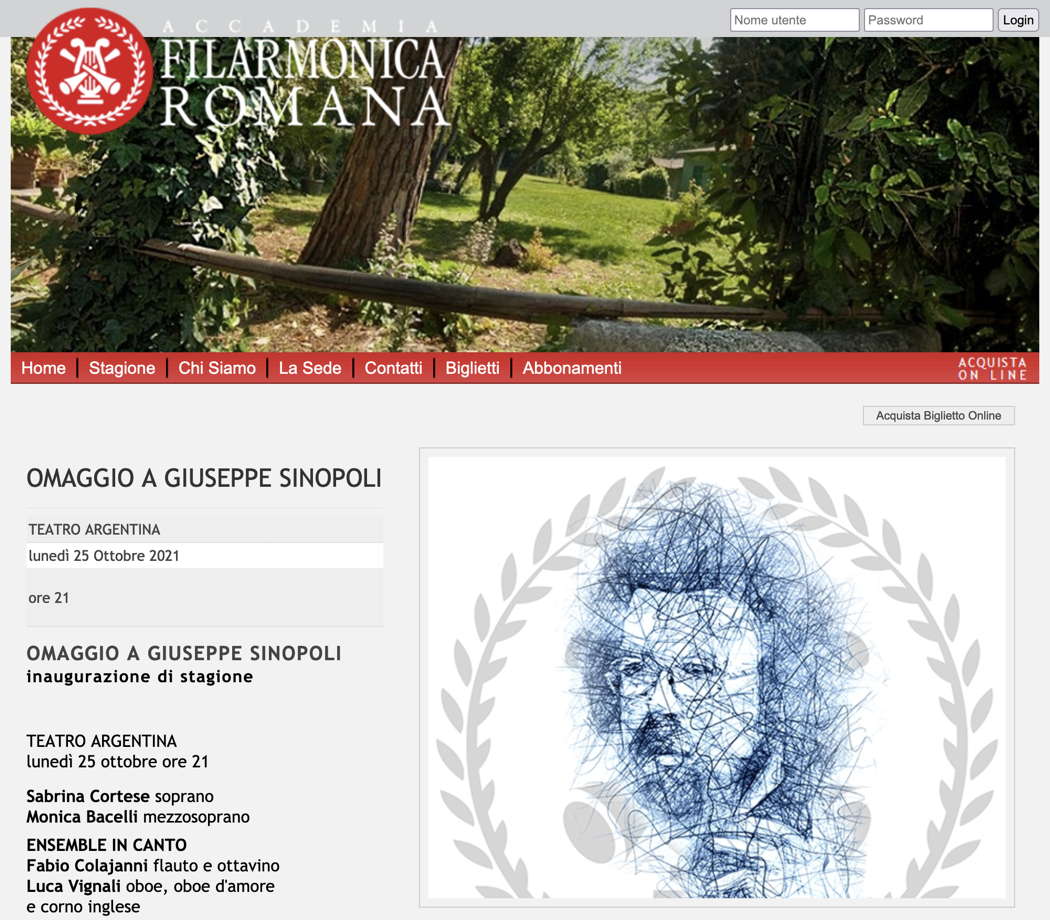
Online publicity for Accademia Filarmonica Romana's 'Omaggio a Giuseppe Sinopoli' concert
A nod to the Academy's 'bicentennial season'. The actual anniversary will be celebrated on 4 December 2021 because the first concert of the 'amateurs' took place, in the hall of Palazzo Odescalchi, on 4 December 1821. For the anniversary, a special concert will take place at the Teatro Olimpico with the Mozart Orchestra conducted by Daniele Gatti and a Georges Aperghis world premiere, commissioned by the Philharmonic Academy. Many and diversified other initiatives are programmed. In addition to the special 4 December concert, there will be a 'colloquium' on 3 and 4 December attended by some representatives of institutions operating in the most original and dynamic musical fields, for a common reflection on music in the present and the future, and on the relationship between musical institutions, cities and different audiences. A documentary will be made, which, with archive material and films, will trace the Philharmonic's two centuries of history. A volume will record the two centuries of the institution. Another publication will be the inventory of the archives, declared of 'particularly important historical interest' by the Archival Superintendence of Latium; they includes important documents starting from 1822. Finally, on 4 December, a commemorative stamp will be issued by the Italian Post Office.
Numerous concerts and events during the bicentenary season will remember artists, musicians and composers who have linked themselves to the history of the Philharmonic Academy. Part of this initiative is the 'Festa della Filarmonica' and the concert by Pietro De Maria. The 'Festa' will take place on 8 December 2021, with artistic director Andrea Lucchesini in the role of pianist, together with some singers from Teatro dell'Opera and musicians of the Accademia Nazionale di Santa Cecilia - a symbolic embrace between the city's main institutions to celebrate together the bicentenary. The tribute to the history of the Philharmonic is the concert on 16 December by Pietro De Maria who will perform some piano pieces, of rare execution, by Giovanni Sgambati, the first important artistic director of the institution from 1893 to 1896, as well as a reference point for the Philharmonic Academy in the transition between the two centuries. The 2021-2022 season promises to be full of different components, open to an audience of all ages, who can choose between chamber music with soloists and ensemble at the Teatro Argentina, dance at the Teatro Olimpico and the most intimate dimension between audience and performers at the Sala Casella. There will be no shortage of young talent and, for the little ones, concerts and workshops to get closer to the world of music, as well as a children's version of Rossini's La Cenerentola.
Copyright © 4 November 2021
Giuseppe Pennisi,
Rome, Italy

MORE ARTICLES ABOUT THE ACCADEMIA FILARMONICA ROMANA



